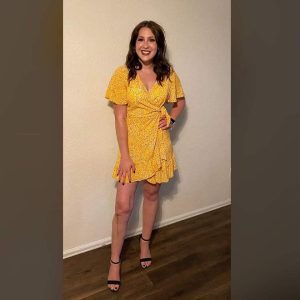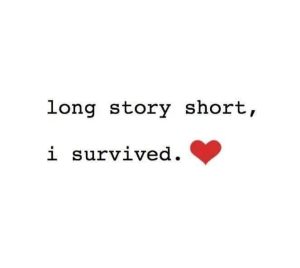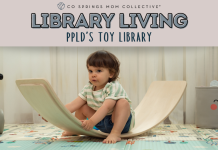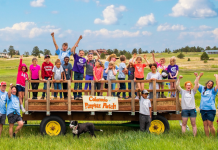Childhood Cancer.
September is Childhood Cancer Awareness Month.
There are very few things in this world, especially as a mom, that stir my soul like childhood cancer.
Hearing the St. Jude marathons on the radio is almost more than I can take. And, if I am being really honest, I have thought, “I am not strong enough for that” and changed the station.
But…
What happens when you can’t change the station? What happens when you become a statistic?
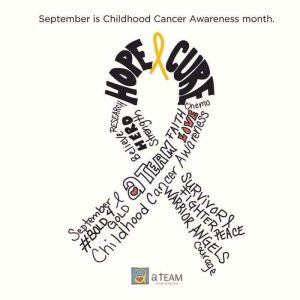
Today, 43 children will be told that they have cancer. 1 in 5 of them won’t survive.
No one escapes death, but there seems to be an unmatched cruelty to the fact that children can be taken away before they have even had the chance to really live. And the parents of those children can’t escape the pain; they can’t change the radio station.
Joe and Debbie Zemlock were those parents.
Their daughter, Amelia, was diagnosed in March of 2014, just a couple months shy of her 17th birthday. An avid volleyball player, she had complained about pain in her right leg which was out of character for her. Her mom was immediately concerned. It was high grade osteosarcoma in her right tibia, bone cancer. That was just the beginning. They were on the brink of a many years’ long journey through biopsies, chemo, port placement/port removal/port placement again… blood clots, transfusions, two flight-for-life trips, limb salvage surgery. In June of 2014, she had surgery to remove the top portion of her tibia and her knee. The doctors installed a titanium prosthesis. But then, infections, blood draws, more chemo.
More heartbreak.
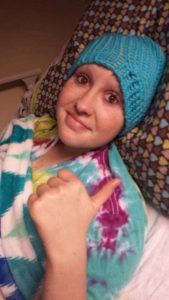
Amelia was eventually declared completely cured of cancer and no remission. No evidence of disease (NED), is a term used during treatment and afterwards when there is no sight of cancer in your scans. At the five-year mark after chemo ends, if there is still no evidence of disease, one becomes cancer free. Despite having to deal with lifelong complications, Amelia was one of the lucky ones.
The Statistics
Today, childhood cancer is the number one killer of kids under 14 to disease. It kills more kids than heart disease, influenzas, chronic respiratory disease and diabetes combined. Across the world, 400,000 children are currently fighting cancer. Still, since the 1970s, only three new drugs have been specifically developed and approved for pediatric cancer treatment and only a small percentage of the budget for the National Cancer Institute is for childhood cancer. This is not acceptable. If you have ever taken a child to Children’s Hospital even for something as simple as a broken arm, you know the specialized care they receive. Children receive treatments specifically for children — from needles made for small veins to medicine in doses designed for small organs.
Now think about that fact, only three drugs for pediatric cancer. If we can create a vaccine for an unknown disease like Covid and disperse it worldwide in less than a year, we can do better for pediatric cancer.
Shining a Spotlight
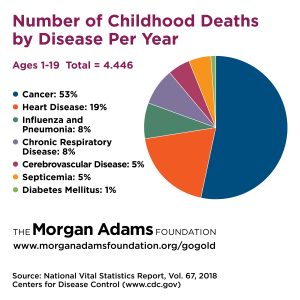
You could never, in one article, in one post, or even in one year shine enough spotlight on childhood cancer to alleviate the pain that even one family endures through this vicious disease. More needs to be done to fight childhood cancer. Everyone always thinks it isn’t going to be them. Until one day, it is. It is your son or your daughter.
Admittedly, I still struggle when reading the detailed accounts of parents like Joe and Debbie. I know these stories are written in the moment as they feel their way through every parent’s worst version of hell and I try to imagine. I pray for them, for their daughter and for all the children they meet along the way. But I want to do more than pray. I want to support these families.
So, I asked Debbie what could we do to support families and patients of childhood cancer? What can those of us watching on the sidelines do while our friends and family run the most important race of their lives? How can we help?
Here is what she suggested:
1. Remember kindness is key.
You never know what news or grief someone might be dealing with, so try to remember to treat everyone with kindness. It could be what holds them together.
2. Don’t be afraid to show your support, even the little things really mean a lot.
Especially for families traveling for treatments, simple things like a gas card or gift cards to restaurants near where they are being seen is helpful. Looking out for things like shoveling the walks, raking leaves, taking the trash to the curb, or dropping off meals can allow them to stay focused on what is most important and not have to worry as much about keeping things going at home.
3. If you want to donate…
Look into donating to the children’s foundation at the hospital where they are being treated. Most hospitals have a foundation, and these are used to provide things like activities for the patients and it will help all the kids there.
4. Don’t forget to reach out to siblings and let them know they are important, too.
When it comes to childhood cancer, even if they aren’t feeling the pain, they are experiencing the effect of cancer, too. Offer to take them on an outing or just be there to listen. They’re going through a lot, as well.
5. Support the parents.
It is astounding and unfortunate how many couples who parent through childhood cancer end up divorced. They are both going through the hardest fight of their lives, too — trying to hold tight to each other. Offer to babysit or a gift card for a night out. Be there as someone to talk to; they need friends too!
Today, Amelia is a thriving young adult, working, spending time with friends and living her best life. May we all live every day knowing the gift that it is. #TeamAmelia #GoGold
